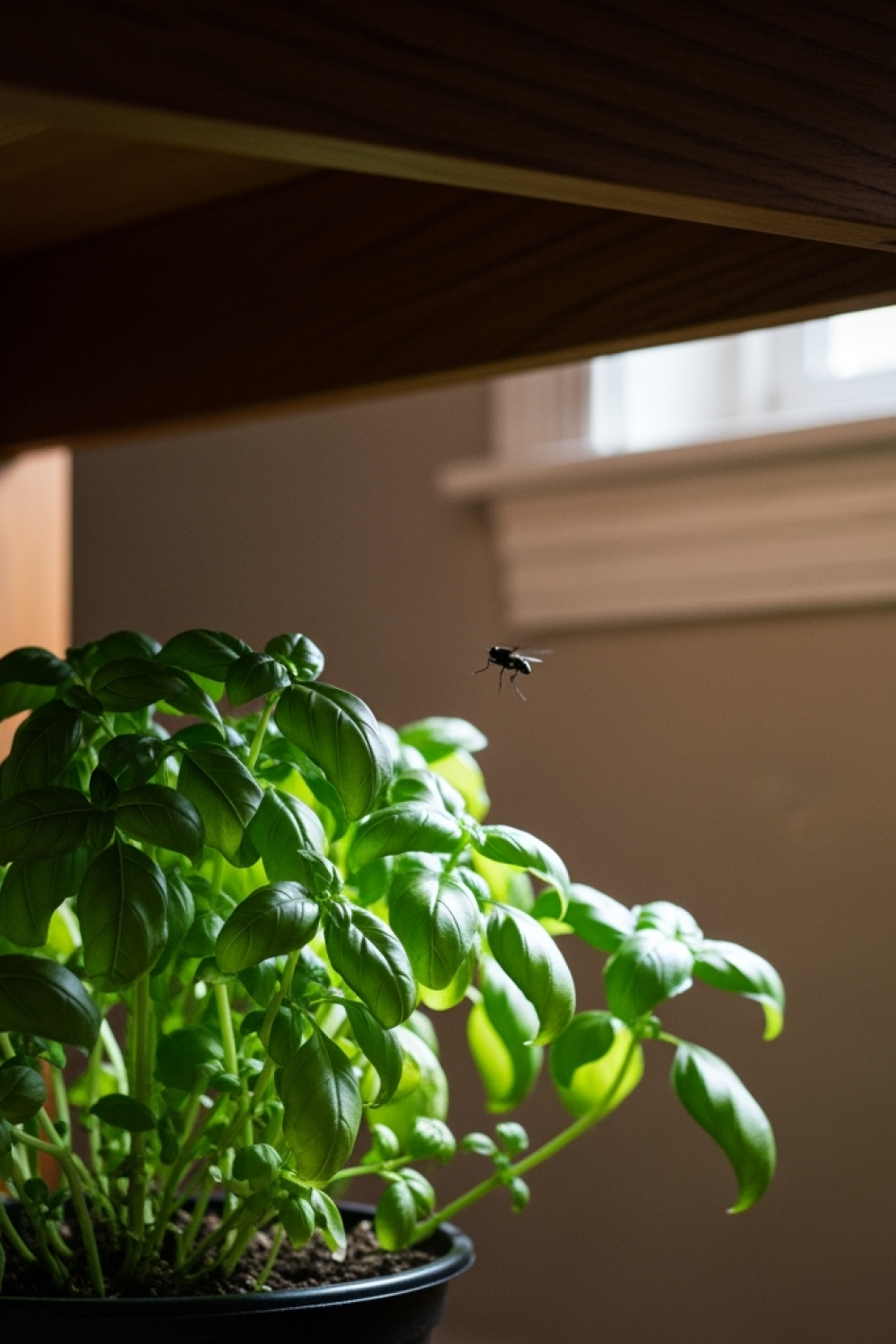Want to save this recipe?
Enter your email below and we’ll send the recipe straight to your inbox!
Introduction
Have you ever noticed how certain plants seem to naturally repel unwanted insects? I discovered this trick by chance during a summer meal on my terrace. While flies kept bothering us, a friend suggested a solution that seemed too simple to be true. Yet, this little trick completely transformed our outdoor dining experience and could revolutionize how you enjoy summer without those buzzing visitors.
The Unsuspected Power of Basil Against Flies
Basil, that aromatic herb we love in our salads and pasta, has a little-known but valuable characteristic: its smell, delicious to us, is particularly repulsive to flies. The solution is therefore disarmingly simple: place a few pots of fresh basil under or around your dining table.
This ancestral technique relies on solid scientific principles. Basil contains volatile compounds such as eugenol, linalool, and estragole that disrupt the olfactory system of flies and other flying insects. These substances, naturally released by the plant, create an olfactory barrier that these insects prefer to avoid.
How to Set Up Your Basil Barrier
Here’s how to proceed to maximize the effectiveness of this trick:
- Choose several well-developed basil plants, preferably in full growth.
- Place them in decorative pots to add an aesthetic touch to your space.
- Strategically position these pots under the table and around your dining area, focusing on places where flies typically enter.
- For optimal effectiveness, slightly crush a few leaves just before sitting down to release more essential oils.
Variations with Other Repellent Plants
If you want to strengthen this natural protection, you can create a true anti-fly shield by combining basil with:
- Mint, whose strong odor also disorients insects
- Lavender, known for its repellent properties against various insects
- Lemongrass, the natural mosquito repellent par excellence, which also works against flies
Common Mistakes to Avoid
Neglecting Plant Care
A dehydrated or unhealthy plant will produce fewer essential oils and therefore fewer repellent compounds. Make sure to water your basil plants regularly and expose them to sufficient light.
Using Dried Basil
Dried basil has lost much of its essential oils and will therefore be much less effective. This trick works exclusively with living, vigorous plants.
Placing Plants Too Far Away
Positioning plants only at one end of the table will limit their effectiveness. For optimal results, completely surround your space with several plants to create a continuous protective barrier.
Additional Benefits for Your Daily Life
This natural solution offers much more than simple protection against flies:
- Health benefit: You avoid exposure to chemicals contained in commercial insecticides, potentially harmful to health.
- Culinary advantage: You constantly have fresh basil available to enhance your dishes.
- Positive environmental impact: This 100% natural method respects biodiversity by not eliminating other beneficial insects.
- Economy: A basil plant costs less than most chemical repellents and renews itself for free.
Expert Opinions
According to Marie Dupont, entomologist at the University of Montpellier: “Using repellent plants like basil represents an interesting alternative to chemical insecticides. The essential oils they produce interfere with insects’ olfactory receptors without creating resistance as is the case with certain chemical products.”
Dr. François Martin, certified herbalist, adds: “Beyond its repellent effect, basil purifies the air and can contribute to a more pleasant atmosphere. It’s a winning solution from all perspectives.”
Summary and Practical Conclusion
Placing basil under your table represents a simple, economical, and natural solution to fully enjoy your meals without the constant annoyance of flies. This ancestral method combines effectiveness with secondary benefits:
- Natural protection against insects
- Permanent access to a fresh aromatic herb
- Healthy alternative to chemical products
- Ecological and economical solution
Don’t wait for the next fly invasion to act! Get yourself a few basil plants today and transform your summer dining experience. Nature often offers us the most elegant solutions to everyday problems.
Frequently Asked Questions
Does basil repel all types of flying insects?
Basil is particularly effective against house flies and certain mosquitoes, but its effect may vary depending on insect species. For more complete protection, combine it with other repellent plants.
How long does a basil plant remain effective?
As long as the plant is healthy and well-maintained, its effectiveness continues. In summer, a plant can live for several months with appropriate care.
Can basil essential oil be used instead of plants?
Yes, but in moderation. A few drops diluted in water and sprayed around your space can reinforce protection, but nothing replaces the continuous effectiveness of living plants.
Does this method work indoors as well?
Absolutely! Basil plants placed on windowsills or near entrances can significantly reduce the number of flies that enter your home.

